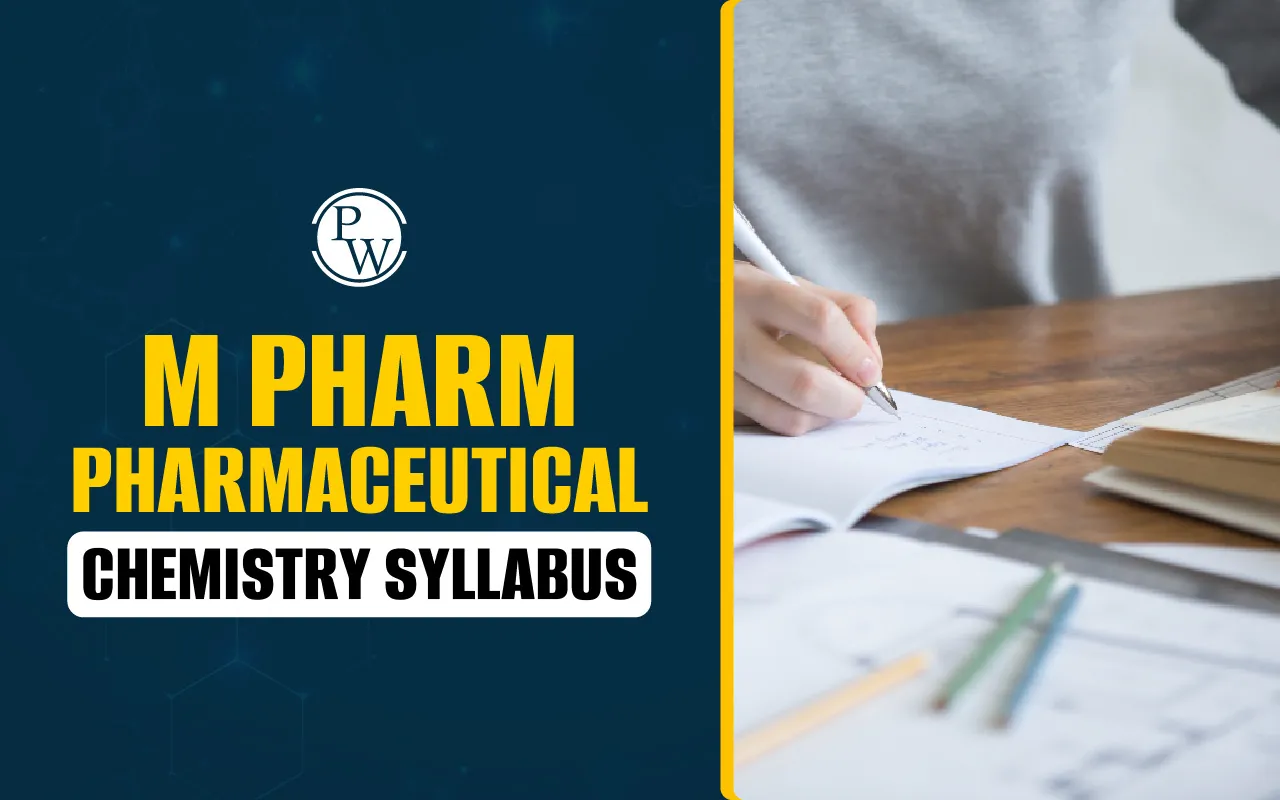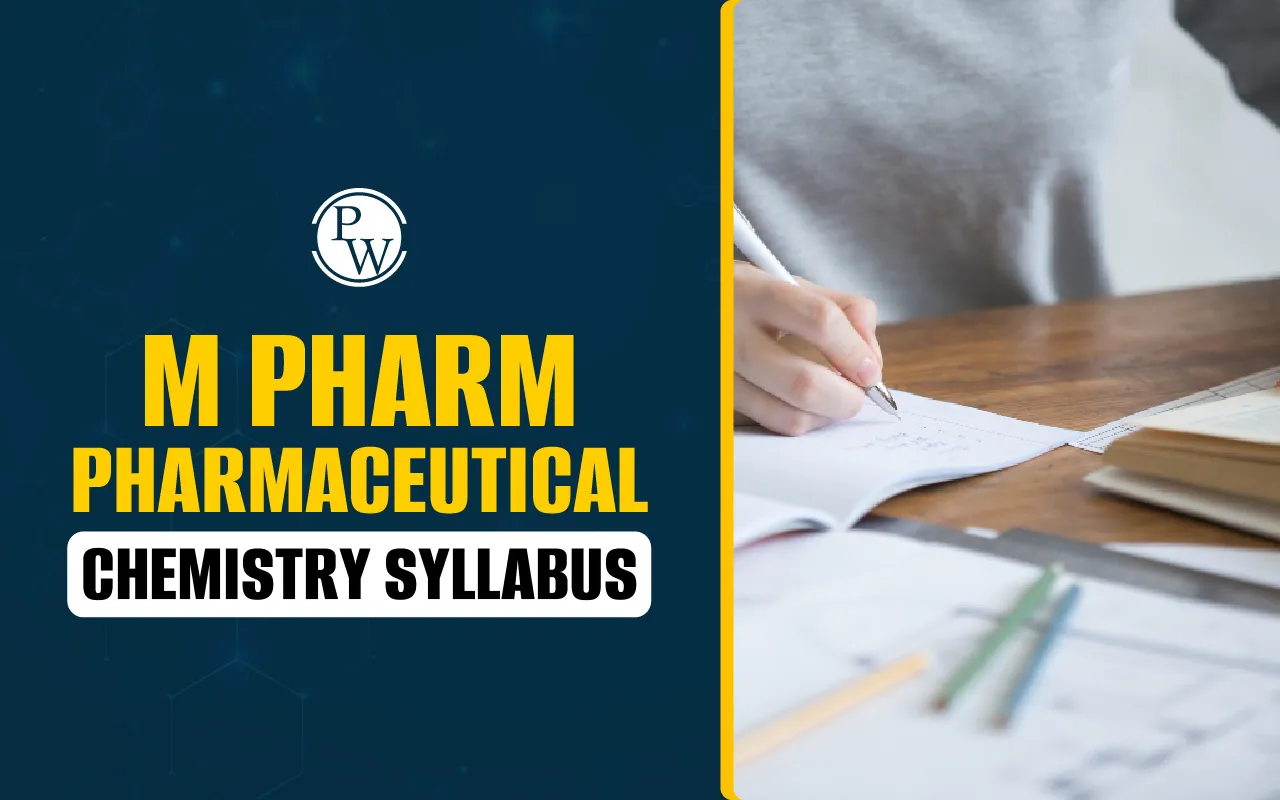

M Pharm Pharmaceutical Chemistry is a two-year postgraduate program offering advanced knowledge and research in drug design, synthesis, and analysis of drugs for human and veterinary use. The program includes advanced organic chemistry, medicinal chemistry, analytical techniques, computer-aided drug design, and aspects of pharmaceutical process chemistry. The program prepares students to develop, analyze, and improve therapeutic agents while developing expertise in modern drug discovery and quality assurance.
Students work in research, the pharmaceutical industry, quality control, clinical trials, and education. The program focuses on developing critical thinking, procedural or practical skills, and knowledge of contemporary research to inform a professional career in the pharmaceutical sciences.
M Pharm Pharmaceutical Chemistry Syllabus Overview
M Pharm Pharmaceutical Chemistry syllabus is carefully designed to provide in-depth knowledge of drug chemistry, mechanisms, and the development of new pharmaceuticals. It combines theoretical knowledge with practical skills to prepare students for research and industry roles.This syllabus is approved by the Pharmacy Council of India (PCI), which ensures that the curriculum meets national standards for pharmacy education.
| M Pharm Pharmaceutical Chemistry Syllabus Overview | |
| Aspect | Details |
| Post Category | M Pharm Pharmaceutical Chemistry Syllabus |
| Conducting Authority | Various universities and institutes across India; National level entrance exam mainly by GPAT conducted by National Board of Examinations in Medical Sciences (NBEMS) |
| Posts | Researcher, Lecturer, Analytical Chemist, Customs Officer, Medical Transcriptionist, etc. |
| Vacancy | Varies by institution and recruitment notifications in academia, industry, and research centers (not centrally fixed) |
| Exam Date | GPAT 2025 exam held on May 25, 2025 (example national level exam) |
| Official Website | GPAT: www.natboard.edu.in |
| Syllabus overview | Includes Modern Pharmaceutical Analytical Techniques, Advanced Organic Chemistry, Advanced Medicinal Chemistry, Pharmaceutical Process Chemistry, Computer-Aided Drug Design, Chemistry of Natural Products, Novel Technologies and Drug Regulatory Affairs, Dissertation, etc., conducted over four semesters (2 years) based on PCI recommendations |
M Pharm Pharmaceutical Chemistry Subjects List
M Pharm Pharmaceutical Chemistry courses aim to create a solid grounding in the understanding of drugs’ development, testing, and analysis. The courses usually cover:
-
Advanced Organic Chemistry
-
Analytical Techniques in Pharmaceutical Chemistry
-
Medicinal Chemistry
-
Pharmacokinetics and Drug Metabolism
-
Molecular Modelling and Drug Design
-
Pharmaceutical Analysis
-
Quality Control and Stability Testing
M Pharm Pharmaceutical Chemistry Syllabus PDF
M Pharm Pharmaceutical Chemistry official PDF is provided by the Pharmacy Council of India (PCI). This document details the course structure, learning objectives, credit distribution, and recommended textbooks. Students can download it from the official PCI website to stay updated with the exact curriculum and examination pattern.For the convenience of students, we are providing a direct link to download the PCI approved pharmaceutical chemistry syllabus PDF below-
M Pharm Pharmaceutical Chemistry Semester-wise Pharmaceutical Syllabus
The M Pharm program is structured into semesters, each of which covers a meaningful area. The semester based approach is important for organizing students' learning of complex concepts.Semester-wise pharmaceutical chemistry syllabus is given below:-
-
Semester 1: Advanced Physical and Organic Chemistry, Analytical Techniques.
-
Semester 2: Medicinal Chemistry, Pharmacokinetics, and Drug Metabolism.
-
Semester 3: Molecular Modeling, Drug Design, Instrumental analysis.
-
Semester 4: Research Methodology, Project Work, Quality Control.
M Pharm Pharmaceutical Chemistry Practical Syllabus
M Pharm Pharmaceutical Chemistry syllabus practicals are important.These practical sessions enable students to apply theoretical concepts in real lab environments. Pharmaceutical chemistry practical syllabus is given below:-
It includes:
-
Synthesis of pharmaceutical compounds
-
Spectroscopic techniques (UV, IR, NMR)
-
Chromatographic methods (HPLC, GC)
-
Quantitative and qualitative analysis of drugs
-
Stability testing and quality assurance
M Pharm Pharmaceutical Chemistry Modern Methods
M Pharm Pharmaceutical Chemistry Modern Methods Modern methods like computer-aided drug design and nanotechnology advance drug research, helping develop effective and safer medicines efficiently. Modern Methods in Pharmaceutical Chemistry emphasizes cutting-edge techniques such as:
-
Computer-aided drug design (CADD)
-
Molecular docking studies
-
High-throughput screening
-
Biomolecular interactions
-
Nanotechnology in drug delivery



